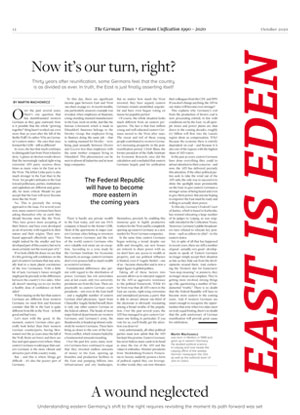Eastern Germany is finally asserting itself
Over the past several years, there’s one question that has dumbfounded western Germans as they gaze eastward: How is it possible that the whole “growing together” thing hasn’t worked out, even more than 30 years after the fall of the Berlin Wall? Or, rather: Why are Germany’s eastern states – the ones that once formed the GDR – still so different?
In 2020, the fact that much continues to distinguish East from West is hard to deny. A glance at election results shows that the increasingly radical right-wing extremist AfD party receives three times as many votes in the East as in the West. The leftist Linke party is also much stronger in the East than in the West. Yet people’s attitudes in the East toward politicians, parties, institutions and capitalism are different and, generally, far more critical. Should we just accept that the East will never become more like the West?
No. This is precisely the wrong approach to the issue. For several years now, many eastern Germans have been asking themselves why on earth they should become more like the West. They have grown more accepting of their history and have even developed an air of serenity with regard to it, their nature and their origins. Their newfound approach effectively says: “We might indeed be the smaller and less developed part of this country, but we’re most certainly not the worst part of it.”
If we look a little bit closer, we see that it’s this growing self-confidence on the part of eastern Germans that may actually lead to a more placid coexistence of the two Germanies. With a little bit of luck, Germany’s future strength might just lie precisely in the differences between the country’s two sides. After all, doesn’t meeting eye-to-eye involve a healthy dose of confidence on both sides?
When musing on the fact that eastern Germans are different from western Germans, we must first and foremost consider that life in the East is quite different from life in the West – in both good and bad ways.
Let’s start with the good. At the moment, eastern German cities generally look better than their western German counterparts, having blossomed over the 30 years since the fall of the Wall. Rents are lower and there are free and open spaces everywhere. Many eastern Germans would argue that eastern Germany is the more vibrant and attractive part of the country today.
But – and this is where things get difficult – it’s also the poorer part of Germany.
To this day, there are significant income gaps between East and West (see chart on page 10). In recent months, one particularly unsavory example was revealed, when employees at Bautzner, a long-standing mustard manufacturer in the East, went on strike. Just like the famous Löwensenf, which is made in Düsseldorf, Bautzner belongs to the Develey Group. But employees living in Bautzen doing the same job – that is, making mustard for Develey – were being paid annually between €8,000 and €12,000 less than employees with the same mother company living in Düsseldorf. This phenomenon can be seen in almost all industries and at most large companies.
There is hardly any private wealth in the East today, and not one DAX company is based in the former GDR. Most of the apartments in major eastern German cities belong to investors from western Germany and the rest of the world; eastern Germans who own valuable real estate are an exception. According to a 2019 study by the German Institute for Economic Research, on average, eastern Germans don’t even possess half as much wealth as western Germans.
Fundamental differences also persist with regard to the distribution of power. Germany has 106 universities and, at last count, only two university presidents are from the East. There are practically no eastern German court presidents – not even in the East itself – and a negligible number of eastern German chief physicians. Apart from Chancellor Angela Merkel herself, there is only one other eastern German in the federal cabinet. The heads of most major federal departments are western Germans, and Germany’s army, the Bundeswehr, is headed up almost exclusively by western Germans. These facts bring us closer to the core of the East-West conflict, which remains fueled by a fundamental misunderstanding.
Over the past few years, many western Germans have continued to argue that they invested endless amounts of money in the East, opening up branches and production facilities in the East and pumping billions into infrastructure and city landscapes. But no matter how much the West invested, they have argued, eastern Germans remain unsatisfied, ungrateful and have even begun voting en masse for populist parties!
Of course, the whole situation looks much different from an eastern perspective. The fact is that four million young and well-educated eastern Germans moved to the West after 1990. The sweat and toil of these young people contributed to western Germany’s increasing prosperity in the post-reunification period. Ulrich Blum, the former president of the Halle Institute for Economic Research, once did the calculation and concluded that eastern Germans largely paid for unification themselves, precisely by enabling this immense gain in highly productive workers for the West and by completely opening up eastern Germany as a new market for West German companies.
At the same time, eastern Germans began noticing a trend: despite our skills and strengths, our new bosses are reticent to share power with us, we don’t have any access to wealth or property, and our political influence is limited, even if Angela Merkel – one of us – became chancellor and is now a major figure in global politics.
Taking all of these factors into account allows us to interpret support for the AfD as aggressive resistance to the political framework. While it’s far from true that all AfD voters in the East are racists, right-wing extremists and unemployed persons, a party that is able to attract almost one-third of the electorate is obviously resonating among a broad swathe of the population. Over the past several years, the AfD has managed to give eastern Germans one feeling in particular: If you vote for us, you’ll finally get the attention you deserve!
And, unfortunately, all other political parties must now admit that the AfD has kept this promise. Eastern Germany has never held as many cards in its hand as since the rise of the AfD and the values it embodies. Minister presidents from Mecklenburg-Western Pomerania to Saxony suddenly possess a form of political capital they can leverage. In other words, they can now threaten their colleagues from the CDU and SPD: If you don’t change anything, the AfD in our states will become even stronger!
This explains why Germany’s exit from the production of brown coal is now proceeding entirely in line with conditions set by the East. As all open-pit mines and power plants are shut down in the coming decades, roughly €17 billion will flow into the Lausitz region alone as compensation. Why? Because the economy there is entirely dependent on coal – and because it is also one of the regions with the highest share of AfD voters.
In the past 30 years, eastern Germans have done everything they could to attract attention to their concerns – and now, the AfD has delivered precisely this attention. If the other political parties seek to take the wind out of the AfD sails, the only way to succeed is to shine the spotlight more prominently on the East, to give eastern Germans a stronger sense of being heard and even to give them power. But anyone hoping to empower the East must be ready and willing to actually share power.
To this day, Germany’s Federal Court of Justice, which is based in Karlsruhe, has resisted relocating a large number of its judges to Leipzig, as was originally intended in the Unification Treaty. Moreover, Germany’s public broadcasters have refused to relocate key positions – such as editors-in-chief – to the eastern states.
Yet, in spite of all that has happened in recent years, there are still a number of good – actually, very good – developments to speak of. Eastern Germans no longer simply accept their situation as fate as they hide out from the developments around them. And, eschewing the Western slur for Easterners’ “non-stop moaning” or jammern, they no longer moan and complain. They’re getting more involved, mixing things up a bit, questioning a number of fundamental “truths.” There is no doubt that the Federal Republic will have to become more eastern in the coming years. And if western Germans are smart enough to recognize the opportunities that arise when two sides meet on truly equal footing, there’s no doubt that the 40th anniversary of German reunification will provide great cause for celebration.
Martin Machowecz
was born in Meißen in 1988 and grew up in eastern Germany. He studied political science in Leipzig and now heads the Leipzig office of the weekly German newspaper Die Zeit, as well as the editorial team of Zeit im Osten.




